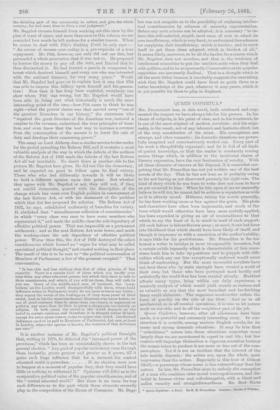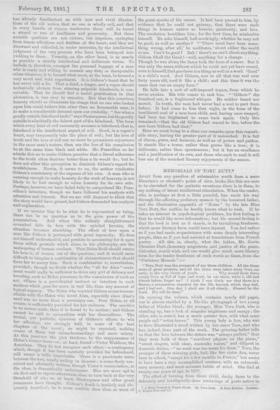QUEEN COPHETUA.*
Mn. FRANCILLON has, in this novel, both confirmed and aug- mented the respect we have always felt for his powers. In his choice of subjects, in his point of view, and in his treatment, he is one of the most original of modern novelists ; and his origi- nality is the result, not of any laboured and fantastic effort, but of the very constitution of his mind. His conceptions are strange, and often romantic ; his dramatic situations are power- fully imagined and conscientiously worked out. Every part of his work is thoughtfully organised ; and he is full of all kinds of quaint knowledge, so that the reader is constantly coming across things which, in addition to the incidental charm of literary expression, have the rare fascination of novelty. With all these elements of success at his disposal, it is somewhat sur- prising that Mr. Francillon has not yet written one of the best novels of the day. That he has not done so is probably owing to his not having as yet discovered precisely his right vein. The kind of story which he was born to write does not seem to have as yet occurred to him. When he hits upon it (as we assuredly believe he will do), he cannot fail to achieve a reputation as wide as it is already sound. Hitherto, taking his novels generally, he has been working more or less against the grain. His plots and characters have often been improbable, aud much of the force which would otherwise have been more usefully applied, has been expended in giving an air of vraiseniblance to that which, to say the least of it, is much in need of such support. All such labour is labour thrown away ; at most, it can but force into likelihood that which should have been likely of itself, and though it impresses us with a conviction of the author's ability, it says little for his good-fortune. Mr. Francillon is far too honest a writer to indulge in mere irresponsible invention, but a certain subtle ingenuity which is characteristic of hirii some- times leads him to take up positions and to grapple with diffi- culties which any one less exceptionally endowed would never think of confronting. But the most successful novelists have not been those who by main strength have created a world of their own, but those who have portrayed most lucidly and. artistically the world that has been created already. Mankind affords many types, lying within our daily experience, a masterly analysis of which would yield results as curious and as valuable as any that the most luxuriant and far-fetching fancy could elaborate. The sagacious wood-cutter enlists the. force of gravity on the side of his blow. And as in all mechanical, so in all mental operations, it is wise to let nature work on our side, and do all the weightiest part of the job.
Queen Cophetua, however, after all allowances have been made, is a powerful and extremely interesting story. In con- struction it is notable, among modern English novels, for its many and strong dramatic situations. It may be trtie that " coincidence " enters into these situations somewhat more largely than we are accustomed to expect in real life ; but few readers will begrudge themselves a vigorous sensation because the means taken to produce it are more or less oat of the com- mon-place. Yet it is not on incident that the interest of the tale mainly depends : the actors are, upon the whole, more impressive than the action. Especially is this true of Gideon Skull,—a personage whose name is less extraordinary than his' nature. In him Mr. Francillon aims to embody the conception of a man who combines utter moral unscrupulousness, and dis- belief in human virtue and. self-abnegation, with a blunt and sullen veracity and straightforwardness. Mr. Bret Harte * Queen Cophetua : a Novel. By It. It Franeillou. London : Matto & Macias. has already familiarised us with now and vivid illustra- tions of the old notion that no one is wholly evil, and that in every bundle of vicious tendencies there will be found a strand or two of kindliness and generosity. But these amiable qualities are not virtues, but impulses, springing from innate affections and frailties of the heart; and they are disowned and ridiculed, in cooler moments, by the intellectual judgment of the very persons who have been betrayed into yielding to them. Veracity, on the other hand, is as nearly as possible a strictly intellectual and deliberate virtue. To include it, therefore, amongst the personal luggage of a man who is ready and willing to commit any dirty or disreputable crime whatever, is to hazard what must, at the least, be termed a very novel and bold experiment. It is Gideon's boast that he has never told a lie. That a thief, a forger, and a rogue should technically abstain from uttering palpable falsehoods, is con- ceivable. That he should feel a moral gratification in that abstention, is less easy to conceive. But that this conscious honesty should so illuminate his visage that no one who looked upon him could believe him other than an houourable man, is to make a considerable demand upon our credulity. " See what a goodly outside falsehood bath !" says Shakespeare, but the goodly outside is admittedly the falsest part of the falsehood. The form which every kind of evil necessarily assumes is falsehood, that is, falsehood is the intellectual aspect of evil Good, in a rogue's heart, may temporarily take the place of evil; but the love of truth and the love of evil can no more be permanent sojourners in the same man's nature, than can the hue of his complexion be at the same time black and white. Mr. Prancillon so far admits this as to make Gideon perceive that a literal adherence to the truth often deceives bettor than a lie would do ; but he
does not allow this perception to diminish Gideon's regard for truthfulness. Herein, it seems to us, the author vindicates Gideon's consistency at the expense of his own. A man who is cunning enough to make honesty do the work of knavery, is not likely to be fool enough to value honesty for its own sake.
Perhaps, however, we have failed fully to comprehend Mr. Frau- cillon's intention, though we have followed his analysis with attention and interest. Bat we are still disposed to think that the story would have gained, had Gideon demanded less analysis and explanation.
If we assume him to be what he is represented as being, there can be no question as to the grim power of the presentation. And when this sullenly straightforward scoundrel falls in love with the spirited heroine, the situation becomes absorbing. The effect of love upon man like Gideon is portrayed with great ingenuity. He does not himself understand it, and persists in accounting for it upon those selfish grounds which alone, in his philosophy, are the mainspring of human conduct. That Helen Reid should return his love is, of course, out of the question ; and it would seem difficult to imagine a combination of circumstances that should force her to marry him. Such a combination is, nevertheless, provided; though we doubt whether the " all for Alan" senti- ment would really be sufficient to drive any girl of delicacy and breeding, such as Helen possesses, to the commission of such an act. sThere is a providential instinct or intuition in such matters which goes for more, in real life, than any amount of logical urgency. The Helen who married Gideon seems irrecon- cilable with the Helen who loved Alan, especially since Alan's need was no more than a pecuniary one. Poor Helen, at all events, is sufficiently punished for her rashness. The sacrifice is no sooner made, than it is found to be useless ; and Gideon cannot be said to sympathise with her discomfiture. The brutal, yet pathetic, cynicism of Gideon's efforts to win her affection, are strongly told, in some of the best chapters of the novel ; as might be expected, nothing comes of them but misunderstandings and more misery, At this juncture the plot thickens, by the reappearance of Helen's former lover—or, at least, friend—Victor Waldron, the American. They do not recognise each other,—a contingency which, though it has been carefully provided for beforehand, still seems a trifle improbable. There is a passionate scene between the two, nearly ending in disaster ; a scene finely con- ceived and admirably written, though Victor's renunciation, at the close, is dramatically unfortunate. Men are more apt to sin first and to repent afterwards, than to turn back at the very threshold of sin ; so, at least, Shakespeare and other groat romancers have thought. Gideon's death is tenderly and elo- quently described ; he is more credible thou than at most of
the great epochs of his career. It had been proved to him, by evidence that lie could not gainsay, that there were such. things in human nature as honour, generosity, and love.
The revelation bewilders him; for the first time, he misdoubts himself. He asks himself, half-mockingly, whether he may not be good, as well as another ? "There must have been some- thing wrong, after all,' he meditates, 'about either the world or me, Can't be good ? Bali! there's no can't about anything.
Gideon Skull the Good I—well, anything for a change
Though he was alone, the fancy took the form of a sneer. But it was only the sneerswithout which he could not yet have owned,
even to himself, that goodness is a thing as well as a word. Good:* is a child's word. And Gideon, new to all that was real over forty years old, used it like a child ; and this time it was the sneer that was an empty form."
He falls into a sort of self-imposed trance, from which he never awakes. His wife comes to seek him. " Gideon !' she breathed out, in a frightened whisper. He neither heard nor moved. In truth, the man had never had a soul to part from before. It had come to him that night, in the form of the bewildered soul of a new-born child, and, having once escaped, had been too frightened to come back again. Only this remained,—that the old Gideon had ceased to live, before the now-born Gideon had died."
Here we must bring to a close our remarks upon this remark- able story, leaving the greater part of it untouched. It is full of charm, grace, and humour, as well as of power and pathos. It stands like a tower, rather than grows like a tree ; it is. deliberate, rather than spontaneous ; but it has an excellence and a justification of its own, and those who omit to read it will lose one of the soundest literary enjoyments of the season.



































 Previous page
Previous page